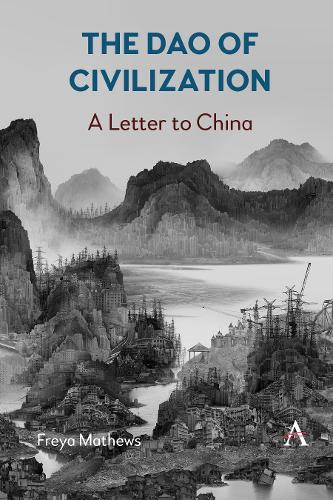
The Dao of Civilization: A Letter to China
(Paperback)
Publishing Details
The Dao of Civilization: A Letter to China
By (Author) Freya Mathews
Anthem Press
Anthem Press
14th February 2023
United Kingdom
Classifications
Professional and Scholarly
Non Fiction
Sustainability
Popular philosophy
Indigenous peoples: religions, belief systems, cultural worldviews and spiritual
304.250951
Physical Properties
Paperback
108
Width 153mm, Height 229mm, Spine 26mm
454g
Description
The book sets out a prospectus for a new form of civilisation patterned at every level to serve and sustain the biosphere. It calls on China to lead the world towards this new era by re-crafting its own civilisation in accordance with its indigenous tap-root: Dao.
The book sets out a prospectus for a new form of civilisation patterned at every level to serve and sustain the biosphere. Starting with the deep philosophical flaw at the core of modernity, namely that the cosmos is devoid of ends of its own, it posits, as an alternative axis for civilisation, that the cosmos indeed actively seeks its own existence, and that its self-realisation is moreover internally structured via an impulse, amongst finite things, towards co-generativity. Termed Dao in ancient China and often coded as Law in Indigenous and First Nations cultures, this innate template is here taken as a first principle for economic production in contemporary societies: basic modes of economic production must transition from antagonistic to synergistic to a specifically biological form of synergy which involves not merely the imitation of natural systems but active collaboration with them. The fact that this first principle is so philosophically alien to the Western mind-set while yet finding strong resonances with Chinese tradition, might encourage China, as an emerging great power, to lead the world in crafting a contemporary form of civilisation that is true to Dao.
An escalating ecological catastrophe is befalling the biosphere in the twenty-first century.The philosophical roots of this catastrophe lie in the deep structural dualism that has characterised the Western tradition. Dualism conceptually divides mind from matter, culture from nature and the human from the animal, thereby giving rise to an exclusively instrumentalist attitude to the natural environment. Science as the engine of modernity is now the chief global vector of dualism and by its means the instrumentalist attitude has spread around the world.
According to the author, this foundational flaw in Western thinking may be traced ultimately to the Greek discovery of philosophia; that is to say, it may be traced to philosophy itself and to the theoretic orientation to which philosophy led. Any escape from dualism thus requires training in an altogether alternative mode of cognition, a strategic and synergistic mode cultivated not via abstract theorising but by visceral, sensory, agentically engaged practices of responsive attunement to ones immediate environment. Such practices were the province of pre-agrarian societies that relied on foraging, and hence on intimate attunement to local ecologies, for their livelihood. Vestiges of this earlier pattern of practice were also preserved in the indigenous Chinese tradition of Daoism via a repertory of psychophysical exercises designed to induce attuned responsiveness to environmental cues.
First-hand opportunities for responsive engagement with local ecologies must rather be routinely available to people today just as they were to earlier peoples. Societies must reconfigure economic praxis so that human agency, in its most routine daily forms of expression, interacts synergistically with the biosphere rather than imposing its own abstractly preconceived designs upon it. This is required not only because such reconfigured praxis will serve and sustain life on earth at a biological level but also because it is what is needed to induct people themselves into ecological awareness. The book includes instances of such alternative, synergistic modes of praxis in agriculture, manufacture and architecture.
As an emerging super-power whose thought-roots are in strategic as opposed to theoretic modes of cognition, China is in a position to assume world leadership in this connection. The author appeals directly to China to reclaim its Daoist heritage, apply this heritage to the problem of praxis today, and thereby light the way towards forms of civilisation more appropriate to our times.
Reviews
For many of us working in the field of regenerative practice, Freya Mathews is the most important environmental philosopher writing today. In this book she sets out profound insights that challenge existing praxis as well as describing the new ways of thinking that will be necessary to shape an ecological civilization. It is hard to conceive of a more urgent task for humanity, and this book is sure to be one of the most illuminating for those that want to lead on that journey Michael Pawlyn, co-author of Flourish: Design Paradigms for our Planetary Emergency and author of Biomimicry in Architecture.
Freya Mathews has given us The Dao of Civilization, an intellectually stunning work that opens new ways of coping with the existential crises of climate change by uncovering the ancient and untapped earth-based philosophies of ancient Chinese Daoism and Australian Aboriginal thought. Mathews persuades us, in her highly accessible and engaging style, that we are anything but helpless in our confrontation with a dramatically changing environment. This is a trailblazing work that will upend the way we think about the world and our place in it Thomas Michael, School of Philosophy, Beijing Normal University; author of In the Shadows of the Dao: Laozi, the Sage, and the Daodejing.
Author Bio
Freya Mathews is Emeritus Professor of Environmental Philosophy at Latrobe University in Australia.
